Top brass: Defying budget cuts to save the school band
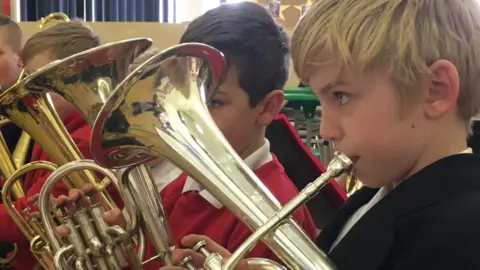 BBC
BBCMusic is too often among the first subjects to be cut as schools make ever tougher budget decisions - but one Yorkshire school is determined to keep its award-winning brass band.
High above Bradford, in the village of Queensbury, brass is in the blood.
Black Dyke Band, one of the world's best known brass bands, was formed here by workers from a local mill 163 years ago and still has its headquarters in the village.
Up the road, at Foxhill primary, pupils are following in these illustrious footsteps.
It began 10 years ago when head teacher Sally Hey brandished a trumpet in assembly, announced she was going to learn and asked if any pupils wanted to join her.
There were plenty. The school acquired 25 trumpets "and we set about teaching the children".
"Now we have a full band with all the sections," Mrs Hey says. "We've got drummers and a variety of brass instruments. And we go out and about and play now."
In March, the band won its section at Harrogate Competitive Festival.
Several former members now play with established community bands. And the school is training new generations of players, the youngest just six.
At a rehearsal in the school hall, they deliver versions of top tunes: from Star Wars and Jurassic Park and When the Saints Go Marching In, arranged for child beginners by conductor Garry Walls, a former pupil who says he owes his own career as a musician and teacher to school music.
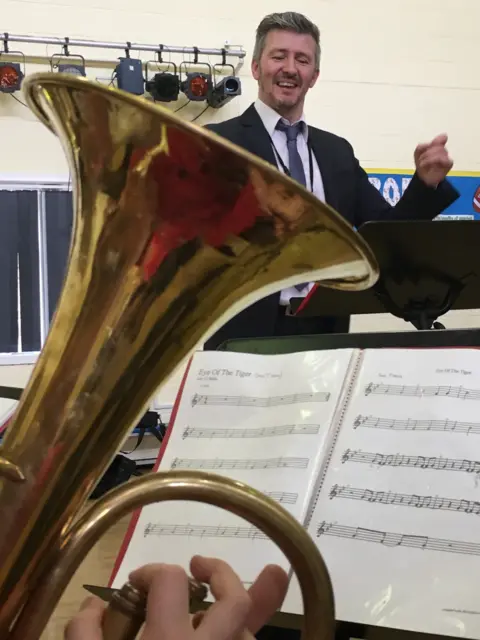
Mrs Hey believes performing is key, which means parents and staff give up their evenings and weekends to travel to concerts and competitions.
In a break, band members swap tales of life on the road.
Trombone player Ellis, 11, met his counterpart from Black Dyke Band when they shared a stage in Huddersfield last year.
"He gave me his card," Ellis says. "We get to play with them and go wherever they played and meet them. And that is inspiring to be honest."
Mistakes are guaranteed to raise a laugh, particularly when they are made by the adult members of the band.
"The best thing is Mrs Hey starts when the drums are meant to come in," says trumpeter Libby, nine.
Of performing, Libby says: "It's scary and then it's not scary".
She and Ellis want to pursue careers in music.
"All the members of Black Dyke Band just started out like us. And we could be like them if we keep pushing forward," says Libby.
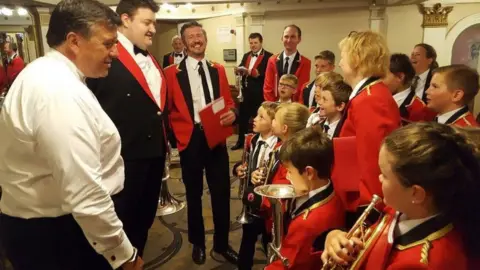 Foxhill Primary
Foxhill PrimaryMusic is a core subject at Foxhill.
Aside from the band, children have daily musicianship training, there are choirs and up to 80 pupils learn instruments.
Mrs Hey credits music for boosting the school's results "way above the national average".
"Children achieve better because they are enjoying school. And of course music is a discipline.
"It's mathematical, so it very much feeds into other subjects, improves their listening skills, improves their motor skills, improves their team work, their communication skills, their social skills. And for us our results are getting better year on year."
Mr Walls believes music particularly helps children who struggle in other lessons.
"This is somewhere they feel like they're really achieving and getting somewhere," he says.
"They know the parts and they're happy to be there. And they're probably then a little bit more able to perhaps go into a maths lesson."
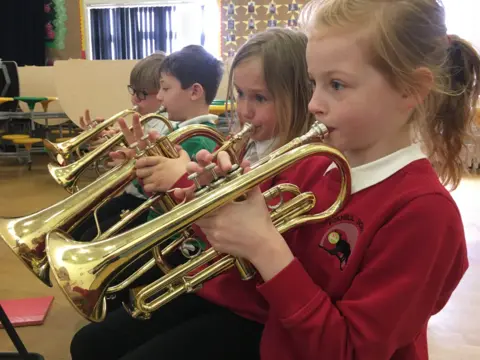
But, despite the benefits, music is not safe at Foxhill.
"We're looking at a potential standstill budget for the next three years, yet there are salary increases," says Mrs Hey.
"I am desperately trying to keep all my staff.
"I don't have money to spend on music, creative arts or anything else for that matter."
Mr Walls already teaches brass classes at another local primary, unpaid because of budget cuts.
He had been teaching brass to Year Four - but about a year ago the school said it could no longer afford to pay him.
Soon afterwards, he was approached by younger children "quite excited and giddy because they'd be doing brass the next year, so I didn't really have the heart to say, 'Well, actually you won't.'"
So this year he has taught the class for nothing.
"I've actually added up the hours I do unbilled," he says.
"I've been doing it over the last 11 months, and I've done over 180."
He says he absolutely doesn't mind but fears any more cuts to his income could push him out of teaching.
"If we lose people like Garry, we can't function," says Mrs Hey.
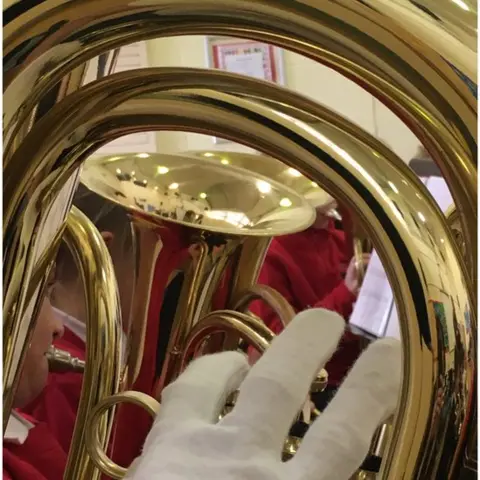
At Foxhill, a grant from Tesco bought new music stands and a B flat bass to replace their dented and rusty one.
Most of the other instruments are from eBay or donations from local people's attics.
"Garry cleans them up and we play them," says Mrs Hey.
But now the band's entire future depends on fundraising. They take buckets to collect cash to almost every performance.
"I'm relying on goodwill here. I think it's inspired locally because there's a lot of music locally," says Mrs Hey.
"We'll carry on fighting for it. That's all I can say really.
"What we really need is sponsorship, because we're struggling."
She believes continuing cuts to school music will stifle talent.
"You're not going to have your pop bands. You're not going to have your orchestras,. You're not going to have your brass bands," she says.
Mr Walls says his own story backs this up,
"I left school at 16 with no real direction as to what I wanted to do, very few qualifications," he says.
"I was in my late 20s when I discovered that, actually, music was the way I wanted to go.
"And I started to work in schools, discovered that I really enjoyed it and I then managed to go on and do my degree, do a post-graduate.
"That wouldn't have been an option if I'd not had my original schooling in music, right from primary school, learning piano and cornet.
"It just wouldn't simply have been an option for me. And now I wouldn't be doing this job."
